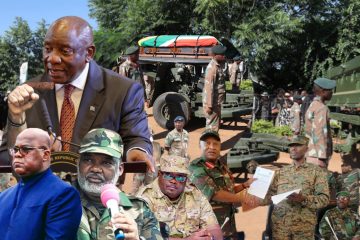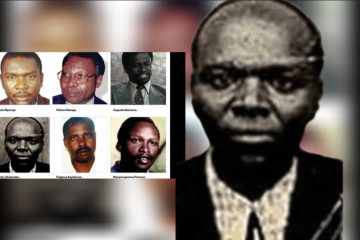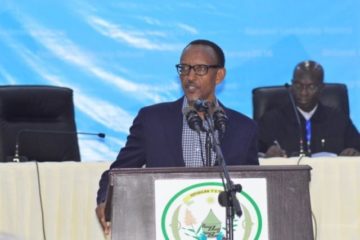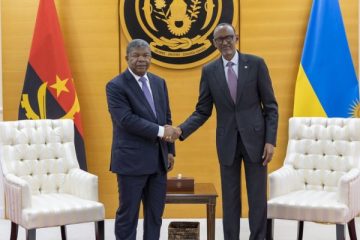“Given the importance and consideration you attach to this, I can only accept”, this is the word the people of Rwanda have been waiting for, from their leader whom they see into him their future.
At exactly 12: 00 am, 1st January 2016, in his New Year message to the nation, President Kagame finally accepted to run for presidency when his current term comes to an end in 2017.
As it is normal for people to be happy and celebrate the New Year, this year, it was extraordinary. Rwanda celebrated more the acceptance of their leader to lead them after 2017.
While the acceptance of the president to run again in 2017 comes at the top as it was high expectation of all Rwandans, the last also celebrate a number achievements attained in 2015.
Ranked 3rd in Africa by the World Bank Doing Business Report 2015 as one the easiest place to do business in Africa, recognized by the United Nations as having and developing the most promising dream Capital City on the African continent, Rwanda has been also acknowledged by the World Economic Forum (WEF) as having the most efficient government in Africa and 7th globally ahead of Malaysia, Switzerland and Luxembourg in 2014 – 2015.

Francis Gatare, CEO Rwanda Development Board
While tale of the Rwanda’s success is told by others, Rwandans have had their say. From 17th – 18th December 2015 Rwandans have had a story to tell. On those dates date, a constitutional referendum was held in Rwanda. Those living abroad voted on 17th while those living in Rwanda voted on 18 December 2015. Among other things, the amendments to the constitution allows President Paul Kagame to run again in 2017.
The recent constitutional referendum process emerged as self-fulfilling prophecy as a petition calling for Article 101 of the constitution to be amended gained over 3.7 million signatures, equivalent to over 60% of registered voters in Rwanda. The constitutional amendments were also approved by the Senate in November 2015 and the “Yes” was voted by more than 98% of Rwandans.

Rwandans casting their votes during the Referendum to lift term limits
Some western actors criticized the proposals, saying that it was undermining democratic principles. However, this was not the concern of the owners the Rwanda’s sovereignty, Rwandans themselves, as they viewed the western actors’ criticism as a mere interference in domestic affairs of their country.
Of course, voting for the amendment of the constitution was a choice of the people of Rwanda for continuity. Two days after the referendum, Rwandans gathered in the annual National Dialogue event under the theme: Rwandans’ Choices: Foundation of National Development and Dignity.
This was an ample opportunity for Rwandans to deliberate and chart the way forward in the country’s development process. Similarly, the National Dialogue provided an opportunity to Rwandans to learn about the new global goals, integrate them into their own vision and commit to the achievement of the Rwanda’s sustainable development goals.
As Rwanda commits to new choices, it also cares much about its people who live in the Diaspora. From October 3rd to 4th, 2015, President Kagame met more than 5,000 Rwandans in Diaspora and friends of Rwanda, living in the Netherlands and around Europe to celebrate Rwanda’s country’s progress. The gathering served also as a time to reconnect with Rwanda’s history, learn about the Rwanda of today and the Diaspora members were encouraged to be an integral part of defining Rwanda’s future, particularly its social-economic transformation.
Definitely, one of the choices of Rwanda is to be an ICT knowledge based economy. In this regard Rwanda organized and hosted the 2015 Transform Africa Summit that attracted more than 2,500 delegates, not just from the African continent, but also from Europe, Asia and the Americas. The theme for the summit was “Accelerating Digital Innovation” and seeks to provide an excellent platform for governments and the private sector to discuss and explore business opportunities and possible partnerships.
More importantly, Rwanda hosted the 84th Interpol General Assembly in 2015 after Senegal in 1992, Egypt in 1998, Cameroun in 2002, and Morocco in 2007. According to international commentators, hosting the 84th Interpol AGM was a clear manifestation of trust that International Community has for Rwanda within international cooperation regime.

Jean Philbert Nsengimana , Minister of Youth and ICT
The Assembly was also attended by President Paul Kagame who lauded the work of international police organisation, Interpol, in making the world a safer place by promoting and enhancing cooperation among the world’s police forces to fight crimes.
In his opening remarks, Kagame described security is the foundation for everything. He said that when it breaks down, the costs are always huge: loss of life, destruction of trust within society and in public institutions, and economic stagnation. He added that Rwanda experienced the worst when the country’s security forces at the time were at the forefront of the genocidal machinery. President Kagame commended Interpol for their efforts in tracking down fugitives wanted for Genocide in Rwanda to ensure justice is done.
It is also important to remind that Assembly was attended by more 1000 delegates from all member states, private and public partners and other national and international organizations. Rwanda is also known to have been hosting both regional and international Police events.
Like in other parts of the world, things do not go well all the time. Rwanda’s intelligence chief Gen. Karenzi Karake was arrested in London. The Rwanda’s spy chief was later granted bail by a court in London, after his legal team including Cherie Blair convinced the court to release him. Gen. Karenzi Karake was later acquitted by the Court. His acquittal also led to the termination of the Spanish indictments against the 40 leaders of the Rwandan Government.
International relations analysts argued that the arrest of Karenzi Karake was a revenge over Rwanda since the last had placed an indefinite ban on BBC broadcasts in the county’s most common language in the wake of the row over the BBC’s Jane Corbin’s revisionist documentary on the 1994 Tutsi genocide.

General Karenzi Karake, Head of NSS
While the arrest of Gen. Karenzi Karake and Jane’s Corbin’s documentary were all seen by the world as unjust acts of Genocide denial and revisionism, Rwanda had earlier come together to commemorate the 21st Anniversary of the Genocide Against the Tutsi on April 7th 2015. This event was attended by President Paul Kagame himself, the first Lady Jeannette Kagame, Government officials, all Rwandans especially survivors of Genocide.
In his speech President Kagame said that during the genocide against the Tutsi in 1994, like very many years before, people were hunted down like animals, sought everywhere and killed by those who were supposed not only to be to be their brothers and sisters but also to share equal rights. He added that people are still being hunted through genocide denial, and denigration of survivors everywhere.
President Kagame came back to the conspiracy of the international community on FDLR; treated by some foreign state actors as untouchable VIPs. He added that the whole world ganged up against Rwanda because of a war in neighbouring Eastern DRC and Rwanda was blamed for a problem for which someone else should have been held responsible.
Equally important point in his speech was that Rwanda has changed for good and forever and that its people value their dignity and are committed to fight for it by all means available and with whatever that is attainable.
The Genocide commemoration to remember more than one million Tutsi killed in 1994 is always followed by the celebrations of the Liberation day after 100 days. The celebrations took place in Gicumbi and attended by President Kagame, other dignitaries and the residents of Gicumbi particulary.
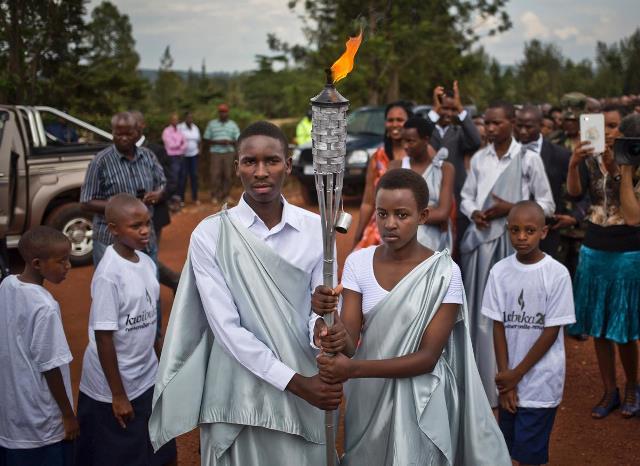
Rwandans commemorating 1994 Genocide against Tutsi
By taking this year’s Liberation anniversary fete to Gicumbi, the Commander in Chief (CIC) of the Armed Forces, Rwanda Defense Forces (RDF) and the Rwanda Patriotic Front (RPF) were showing appreciation to the people of the northern part of the country for having worked with the former RPF / RPA during the struggle to liberate the country from a genocidal regime.
In a similar context, President Kagame took time to rubbish French President Hollande’s condescending letter. President Hollande had said in the letter that “despite the development and progress Rwanda has made, Rwanda should remember to respect human rights”.
The letter came while the world and Rwanda particularly know that France had not done anything to save lives and had not only been complicit but also an actor in the genocide against the Tutsis in 1994.
Point in the conviction of President Kagame is always that injustices which Rwanda suffered have motivated Rwandans to work harder to find solutions to the problems. From 12-13 February 2015, Rwanda hosted high-level international conference on Capital Markets to discuss issues affecting the development of African capital markets, especially in East Africa.
President Kagame pointed to the impact of capital markets on development and reiterated that even though capital markets seem to be about money, ultimately they are about people. He added that in working to prioritise capital market development, Africa was opening a new chapter in its story of liberation, by addressing the deeper structural deficiencies that have kept Africa at the margins of the world economy.
As a title coined by one of the Rwandan Government Officials for her book, “Rwanda means Universe”, Rwanda has taken its security assurance and peace keeping operations expertise to other parts of the world. Rwandan peacekeepers, everywhere they are deployed, are commended their professionalism and commitment in bringing peace and stability to the countries where they are deployed.
As matter of fact, during the Pope Francis official visit to Central African Republic (CAR), first pontiff in recent history to visit a war zone in Africa, when he arrived, he declared himself a“pilgrim of peace and an apostle of hope”. This couldn’t happen if he wasn’t protected. Physically proper and spiritually fine, Rwandan peace keepers were there, smartly secured Bangui, and collaborated with others for a safe trip of the pontiff. Likewise, the good job to make the electoral processes successful in that country is being done.
Finally, let the Good news ring, just recently? As we were approaching Chrismas and the end of the year, the mood in the MOD (Ministry of Defense) came up smelling like roses. The Commander in Chief promoted many officers and men, interestingly; some of them are even on the foreign soil, in peace keeping operations

Rwanda peacekeepers in Central African Republic and South Sudan.
Rwanda’s history is unique, and Rwanda needs to use unique choices to position itself in order to survive and thrive. Rwanda welcomes criticism and advices from others but it is paramount and justifiable to stand tall and convince them to switch to its brands.
Surely, the year 2015 was unique in its own way but Rwanda has also wound up its business in its own style in 2015.
Rwanda, Merry Christmas and Happy New Year 2016. May this year be a year of Milk and honey to the first family, our leaders and our compatriots at large
Emmanuel
END



